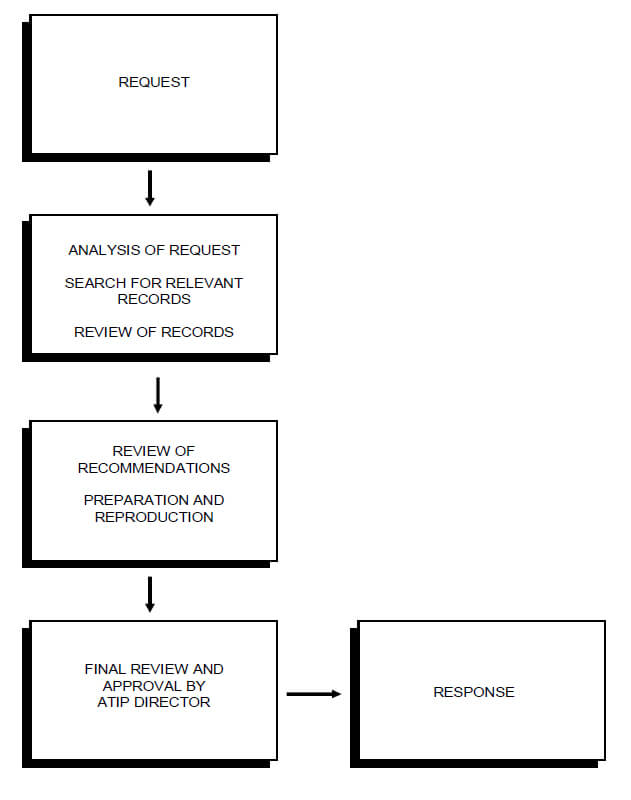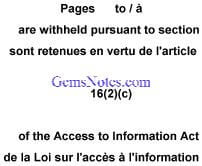When you request your GCMS file from IRCC it goes through various stages of processing. After about 30 days when you receive your file you may see that some sections or even entire pages of the file are blank. When this happens it means that certain information has been redacted from your file. In such cases you will see s15, s16 or s19 in the top right hand corner of the file. This article explains what it means and if you should be concerned about it.
Table of Contents
- What does disclosed in part and s15, s16 & s19 mean?
- Should applicants be concerned?
- Why some applicants have this and others don’t?
- How does it impact your application?
- Access to Information Act and Privacy Act Exemption Grid
What does disclosed in part and s15, s16 & s19 mean?
When you request your GCMS file it goes through these stages for processing at IRCC. As part of this process IRCC may refuse to disclose some information prior to releasing it. Such actions are often taken under sections 15, 16 or 19 of the Access to Information Act, this is the act under which the GCMS notes are requested.

If you notice the words s15, s16 or s19 in the top right hand corner of your GCMS notes then it means that your GCMS file has been “disclosed in part”. s15, s16 or s19 correspond to the respective sections of the Act. The majority of the exemptions invoked by IRCC fall under these sections of the Act:
- Subsection 15(1), covers international relations, defence and subversive activities
- Subsection 16(1), addresses law enforcement and criminal investigations
- Subsection 19(1), protects personal information
More than 1 section of the Act can be applied to a specific GCMS request.
The above are just the common exemptions seen on a GCMS file. For the full list of all the exemptions see the Access to Information Act and Privacy Act Exemption Grid
Should an applicant be concerned when information under these sections is redacted from the GCMS notes?
Applicants should not be worried about this. Unless, the applicant did not disclose something that he/she was aware of. Redacted information in most cases does not impact the processing of your visa application. How IRCC determines what information should be withheld is an internal process which the department does not disclose to the general public. In some cases the visa application processing may get delayed if IRCC is seeking information from foreign governments and agencies.
Here are some of the reasons why information may be redacted from GCMS notes:
- To protect personal information, such as the names of family members or friends.
- To protect confidential information, such as information about security or intelligence matters.
- To protect the identity of witnesses or informants.
- To protect the privacy of third parties, such as employers or landlords.
- To protect the integrity of the immigration process, such as by preventing fraud or misrepresentation.
To find out if this applies in your case, order your GCMS notes to get the details.
Why only some applicants have this and others don’t?
All visa applications are verified against a large number of datasets and this process is not disclosed to the general public. Data analytics is also a key verification tool which is used to make connections and identify trends that are not otherwise possible through traditional methods of verification. Additionally, the Canada Border Services Agency (CBSA) has something called the “lookout” report which is intelligence on actual or suspected infractions or criminal activities that may result in the interception of inadmissible people. A lookout “hit” will “flag” or identify particular individuals. Since each visa applicants situation differs that is why some have this and others don’t.
Usually, information redacted under sections s15, s16 or s19 is application specific and will differ from application to application. Here are some reasons why only some applicants have information redacted from their GCMS notes while others do not:
- The nature of the application: Some applications are more sensitive than others, such as those involving security or intelligence matters.
- The applicant’s history: Applicants with a history of criminal activity or other problems may have information redacted from their GCMS notes.
- The applicant’s country of origin: Applicants from certain countries may have information redacted from their GCMS notes due to security concerns.
To know if this has happened in your case, order your GCMS notes to find out. If you have already received your file then know that Your GCMS Notes contains sensitive information, keep it secure!
What does invoking exemptions and refusal to disclose information under these sections mean and how does it impact your application?
- Section 15 International affairs and defence
The information not disclosed will be under a specific subsection of section 15. Section 15(1) states as follows:
- The head of a government institution may refuse to disclose any record requested under this Part that contains information the disclosure of which could reasonably be expected to be injurious to the conduct of international affairs, the defence of Canada or any state allied or associated with Canada or the detection, prevention or suppression of subversive or hostile activities, including, without restricting the generality of the foregoing, any such information
- (a) relating to military tactics or strategy, or relating to military exercises or operations undertaken in preparation for hostilities or in connection with the detection, prevention or suppression of subversive or hostile activities;
- (b) relating to the quantity, characteristics, capabilities or deployment of weapons or other defence equipment or of anything being designed, developed, produced or considered for use as weapons or other defence equipment;
- (c) relating to the characteristics, capabilities, performance, potential, deployment, functions or role of any defence establishment, of any military force, unit or personnel or of any organization or person responsible for the detection, prevention or suppression of subversive or hostile activities;
- (d) obtained or prepared for the purpose of intelligence relating to
- (i) the defence of Canada or any state allied or associated with Canada, or
- (ii) the detection, prevention or suppression of subversive or hostile activities;
- (e) obtained or prepared for the purpose of intelligence respecting foreign states, international organizations of states or citizens of foreign states used by the Government of Canada in the process of deliberation and consultation or in the conduct of international affairs;
- (f) on methods of, and scientific or technical equipment for, collecting, assessing or handling information referred to in paragraph (d) or (e) or on sources of such information;
- (g) on the positions adopted or to be adopted by the Government of Canada, governments of foreign states or international organizations of states for the purpose of present or future international negotiations;
- (h) that constitutes diplomatic correspondence exchanged with foreign states or international organizations of states or official correspondence exchanged with Canadian diplomatic missions or consular posts abroad; or
- (i) relating to the communications or cryptographic systems of Canada or foreign states used
- (i) for the conduct of international affairs,
- (ii) for the defence of Canada or any state allied or associated with Canada, or
- (iii) in relation to the detection, prevention or suppression of subversive or hostile activities.
Information under section 15 is withheld when IRCC or a Canadian agency has requested information from a foreign government or agency. This may be anything from checking your record in a foreign country to verifying the information you have provided in your visa application. Most applicants who see this in their GCMS file should not worry. This is a routine check and does not impact the processing of your visa application.
- Section 16 Law enforcement and investigations
The information not disclosed will be under a specific subsection of section 16. Section 16 states as follows:
- 16 (1) The head of a government institution may refuse to disclose any record requested under this Part that contains
- (a) information obtained or prepared by any government institution, or part of any government institution, that is an investigative body specified in the regulations in the course of lawful investigations pertaining to
- (i) the detection, prevention or suppression of crime,
- (ii) the enforcement of any law of Canada or a province, or
- (iii) activities suspected of constituting threats to the security of Canada within the meaning of the Canadian Security Intelligence Service Act,if the record came into existence less than twenty years prior to the request;
- (b) information relating to investigative techniques or plans for specific lawful investigations;
- (c) information the disclosure of which could reasonably be expected to be injurious to the enforcement of any law of Canada or a province or the conduct of lawful investigations, including, without restricting the generality of the foregoing, any such information
- (i) relating to the existence or nature of a particular investigation,
- (ii) that would reveal the identity of a confidential source of information, or
- (iii) that was obtained or prepared in the course of an investigation; or
- (d) information the disclosure of which could reasonably be expected to be injurious to the security of penal institutions.
- (a) information obtained or prepared by any government institution, or part of any government institution, that is an investigative body specified in the regulations in the course of lawful investigations pertaining to
- Security (2) The head of a government institution may refuse to disclose any record requested under this Part that contains information that could reasonably be expected to facilitate the commission of an offence, including, without restricting the generality of the foregoing, any such information
- (a) on criminal methods or techniques;
- (b) that is technical information relating to weapons or potential weapons; or
- (c) on the vulnerability of particular buildings or other structures or systems, including computer or communication systems, or methods employed to protect such buildings or other structures or systems.
- Policing services for provinces or municipalities (3) The head of a government institution shall refuse to disclose any record requested under this Part that contains information that was obtained or prepared by the Royal Canadian Mounted Police while performing policing services for a province or municipality pursuant to an arrangement made under section 20 of the Royal Canadian Mounted Police Act, where the Government of Canada has, on the request of the province or municipality agreed not to disclose such information.

Section 16 of the Act refers to refusal to disclose based on information prepared by a government institution which investigates to detect crime, threats to Canada, investigation reports by federal and provincial agencies. When an applicant has information redacted under this section, it usually refers to information sought from investigation agencies about the applicant. This could range from investigations by CSIS, verification of RCMP reports or verification of all places an applicant has lived in Canada and ensure that the applicant has no pending cases or arrests.
The Canadian Security Intelligence Service (CSIS) is Canada’s primary national intelligence service. It is responsible for collecting, analysing, reporting and disseminating intelligence on threats to Canada’s national security, and conducting operations, covert and overt, within Canada and abroad. It also reports to and advises the Government of Canada on national security issues and situations that threaten the security of the nation. You can also request your CSIS report from GcmsNotes.com
- Section 19 Personal information
- 19 (1) Subject to subsection (2), the head of a government institution shall refuse to disclose any record requested under this Part that contains personal information.
- Marginal note:Where disclosure authorized(2) The head of a government institution may disclose any record requested under this Part that contains personal information if
- (a) the individual to whom it relates consents to the disclosure;
- (b) the information is publicly available; or
- (c) the disclosure is in accordance with section 8 of the Privacy Act.
Access to Information Act and Privacy Act Exemption Grid
| Access Section | Privacy Section | Subject | Comments |
|---|---|---|---|
| n/a | 18(2) | exempt bank information | information contained in a personal information bank designated as an exempt bank |
| 13(1) | 19(1) | information obtained in confidence | obtained in confidence from a foreign, international, provincial, municipal or aboriginal government |
| 14 | 20 | federal-provincial affairs | injurious to the conduct of federal-provincial affairs |
| 15(1) | 21 | international affairs and defence | injurious to the conduct of international affairs, defence of Canada |
| 16(1) | 22(1) | law enforcement and investigation | information obtained/prepared by a government institution that is an investigative body; information relating to investigative techniques or plans for specific lawful investigations; injurious to enforcement of any law of Canada; injurious to the security of penal institutions |
| 16(2) | n/a | security | reasonably expected to facilitate the commission of an offence |
| 16(3) | 22(2) | policing services for provinces or municipalities | information obtained/prepared by the RCMP while performing policing services for a province or municipality |
| 16.1 | 22.1 | relating to investigations, examinations and audits | information obtained/created by the Auditor General, Commissioner of Official Languages, Information Commissioner or Privacy Commissioner in the course of an investigation, examination or audit |
| 16.2 | n/a | investigations | information obtained/created by the Commissioner of Lobbying in the course of an investigation |
| 16.3 | n/a | investigation, examination or review | information obtained/created by a person who conducts an investigation, examination or review in the performance of their functions under the Canada Elections Act |
| 16.4 | 22.2 | investigation or settlement | information obtained/created by the Public Sector Integrity Commissioner in the course of an investigation or in an attempt to reach a settlement pursuant to the Public Servants Disclosure Protection Act |
| 16.5 | 22.3 | disclosure pursuant to the Public Servants Disclosure Act | information created for the purpose of making a disclosure under the Public Servants Disclosure Act or an investigation into a disclosure under that Act |
| 17 | 25 | safety of individuals | disclosure could reasonably be expected to threaten the safety of individuals |
| n/a | 23 | security clearances | information obtained/prepared by an investigative body in determining whether to grant security clearances |
| n/a | 24 | individuals sentenced for an offence | information collected/obtained by Correctional Service Canada or the National Parole Board while the individual was under sentence for an offence |
| 18 | n/a | economic interests of Canada | trade secrets/financial/ commercial/scientific/technical information belonging to the Government of Canada; information that would prejudice the competitive position of a government institution/interfere with contractual or negotiations; scientific or technical information obtained through research by an employee, the disclosure of which could deprive the officer or employee of priority of publication; information the disclosure of which could be materially injurious to the financial interests of a government institution |
| 18.1 | n/a | economic interests | trade secrets, financial, commercial, scientific or technical information that belongs to and is consistently treated as confidential to the Canada Post Corporation; Export Development Canada; the Public Sector Pension Investment Board; or VIA Rail Canada Incorporated |
| 19(1) | 26 | personal information | personal information about an individual other than the individual who made the request |
| 20(1) | n/a | third party information | information belonging to a third party that contains trade secrets, financial, commercial, scientific or technical information; information that could result in material financial loss or gain to, prejudice the competitive position; information that could interfere with contractual negotiations |
| 20.1 | n/a | third party investment information | investment information received in confidence from a third party by the Public Sector Pension Investment Board |
| 20.2 | n/a | third party investment information | investment information received in confidence from a third party by the Canada Pension Plan Investment Board |
| 20.4 | n/a | details of a contract or the identity of a donor | contract details for services of a performing artist/the identity of a donor who made a donation in confidence to the National Arts Centre Corporation |
| 21(1) | n/a | advice etc. | Advice/recommendations, consultations/deliberations, positions/plans for negotiations, or plans about personnel management that have not yet been put into operation |
| 22 | n/a | testing procedures, tests and audits | information relating to testing or auditing procedures or techniques or details of specific tests to be given or audits to be conducted |
| 22.1 | n/a | internal audits | draft report of an internal audit of a government institution |
| 23 | 27 | solicitor-client privilege | information subject to solicitor-client privilege |
| 24 | n/a | statutory prohibitions | information the disclosure of which is restricted by a provision set out in Schedule II |
| n/a | 28 | medical records | Personal information that relates to the physical or mental health of the individual |

